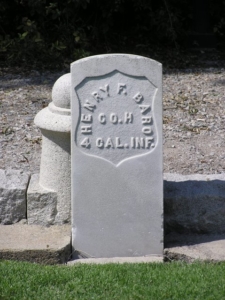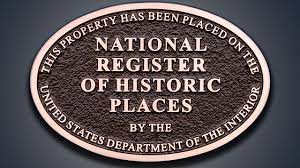Henry Frazef Barrows
/by
Henry Frazef Barrows
Date of Birth: 29 Sep 1839
Born In: Ohio
Age: 59
Occupation: Manager of a livery stable
Marital Status: Single
Died: 18 Jan 1899
Cause of Death: Urenic poisoning
Death Location: San Mateo
Burial Plot: GAR
FindaGrave ID: 5792765

Obituary
Henry Frazef Barrows.
The year 1861 will be ever memorable as the period when a great dissension between two vast sections of the country threatened the dismemberment of the nation. Joint resolutions had passed both houses of the California legislature, pledging the state to respond to any call from the President for assistance in putting down the rebellious foes of the government. The consequence was, that in many towns and villages throughout the coast, military companies were immediately organized and equipped for the emergency that was expected to arise at any moment. Among other organizations of this character, company H was fitted out in Trinity county, and became a part of the Fourth California volunteer infantry. Men were being called for to fill the ranks of this regiment, and the subject of this sketch was one of the first to respond. The regiment was divided, a portion being ordered to the north and a portion to the south. Mr. Barrows was among those who went into the southern country, camping for a short time, for drill, about nine miles from Los Angeles. They were then ordered to Arizona, Company H, to which Mr. Barrows was attached, performing forced marches of fifty miles, at times, over the burning sands of a glaring desert, beneath the torrid heat of a tropical sun, burdened with the weight of knapsack, cartridge box, and gun. It was indeed a patriotic motive that imbued these men with the strength and energy sufficient to enable them to endure the privations of that terrible march. They remained at Fort Yuma a short time and then resumed their march across the deserts of Arizona and New Mexico, finally reaching the Rio Grande and establishing headquarters at El Paso, Texas. He then re-crossed the desert to the city of Los Angeles, and was honorably discharged at Drum barracks, Los Angeles county, after a service of three years, his record being that of a thorough soldier. We are not surprised that Mr. Barrows should have been found among those who loved their country better than life, and who resolved that the honor and integrity of the whole Union should be maintained, and that the stars and stripes should wave above every section of the United States as long as a single dollar or a drop of blood remained in the north, for he came from a family of patriots, and first saw the light in a state, the people of which love the grand old principles embodied in the motto: " The Union forever, and liberty to all men."
Mr. Barrows was born in Cincinnati, Ohio, September 29, 1839. At the age of twelve years he went to New Orleans, where he was employed as a cabin boy on the steamer Susquehanna, plying on the Mississippi and Ohio rivers. Having followed this occupation two years, he returned to his native city, and remained there until he came to California, in the spring of 1854. He proceeded to Oregon and thence to Puget Sound, where he was in the employ of the government until 1860, when he returned to San Francisco, and in the following year enlisted as has already been described. At the close of the war he was employed in a general merchandise store in Los Angeles. In 1867 he came to Pescadero and afterwards to San Mateo, where he is at present the manager of Hon. James Byrnes' livery stable. Mr. Barrows is not, in any sense of the phrase, a policy man. He is either a friend or a foe, and he makes no concealment of his position towards those whom he likes or dislikes. He is, however, always kind and courteous, and generous to a fault, and bears an enviable reputation for honesty and sterling integrity in the community where he lives. As we close this brief sketch of this old settler and patriotic soldier, we cannot help expressing the heartfelt wish that many years may pass away before the bugle call of death shall summon him to the bivouac of eternity.

